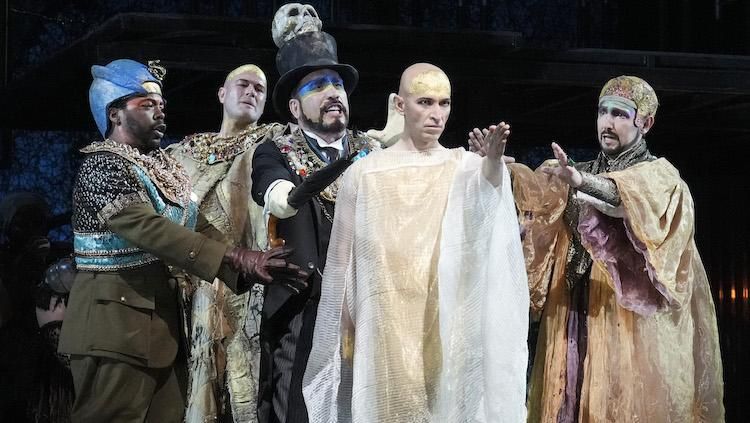Throughout history and even today, living an authentic, queer life is a radical act. This is definitely the case for Anthony Roth Costanzo, the celebrated out countertenor currently starring in the Metropolitan Opera’s production of Akhnaten, Philip Glass’s opera about another queer radical who happened to be a ruler of ancient Egypt. Timed with the opera’s run, Costanzo chats with The Advocate about representing queerness in the past and the challenges of protecting our authentic identities in the future.
Growing up the son of psychology professors at Duke University, Costanzo was fortunate to have supportive parents who championed self-expression and encouraged him to accept his queer self. But he’s aware of the importance of role models, noting that he gets “so many letters and notes from the queer community and people who are really happy and inspired by the way I make [my queerness] a part of my art making and a part of my mission as I make art.”
Rihab Chaieb as Nefertiti and Anthony Roth Costanzo as Akhnaten
Currently, Costanzo is inspiring and wowing audiences in Phillip Glass’s third opera, Akhnaten, at the Metropolitan Opera. This production is a revival of the hit 2019 production starring Costanzo. The Metropolitan Opera’s recording of Akhnaten (also starring Costanzo) recently won the 2022 Grammy for Best Opera Recording. Akhnaten tells the story of 13th-century B.C. revolutionary Egyptian Pharaoh Akhnaten (also known as Amenhotep IV), who abandoned Egypt’s traditional religion of polytheism (multiple gods) in favor of monotheism (one god). Akhnaten ruled as pharaoh for 17 years until conservative traditionalists revolted against the new religion and assassinated him. Akhnaten’s monuments were dismantled or hidden, his statues destroyed, and his name was removed from historical documents and records.
Although much of Akhnaten’s story is unknown, enough exists to demonstrate that the ruler’s radical thinking extended beyond religion and has historical implications for the queer community. To prep for the role, Costanzo researched the life of Akhnaten, traveling to Oxford, Berlin, and the Metropolitan Museum to see the Egyptian collections and historical depictions of the pharoah in those places. He noticed that Akhnaten was often depicted with feminine breasts and hips and thought, Was he intersex? What’s the deal? He spoke with Egyptologists and learned that the god that Akhnaten worshipped was seen as the unification of man and woman. It appeared that Akhnaten, in an attempt to become closer to his god, was trying symbolize this unification in the art that depicted him as well as in his personal life. In the Met’s production, Constanzo first enters completely nude and is then dressed by servants in spectacular gowns. Later, he wears a sort of slip under transparent garments to suggest a more feminine body. Constanzo feels that this type of transformation signals a kind of fluidity of gender. It may seem like an oversimplification to say that Akhnaten was the first trans icon since it’s not known how Akhnaten perceived their gender. What we know is that Akhnaten was erased from history because his ideas were too new and too progressive. For queer, nonbinary, and trans people, the story of a mysterious icon who was erased for being too radical is all too resonant.
In addition to his Grammy-winning album, Costanzo recently released an album of songs with gender-bending vocal artist Justin Vivian Bond, Only an Octave Apart. The album is fascinating, with imaginative, trippy covers of cabaret songs, pop songs, and opera arias. Costanzo and Bond took their show on the road, performing with the New York Philharmonic and in cabaret venues. Costanzo calls the collaboration a real revelation. “When I started working with Vivian, who was one of the queer icons for me since I was in my early 20s, I had so much joy. I was thinking about why that was and I realized that it was [due to] the combination of our voices and our personalities and our friendship. When we put that into music-making, it became an expression of our identity. I can’t say how liberating that was even for someone like me who hasn’t had to struggle that much,” Costanzo says. “It also made my singing and my art-making, in general, better — to my great surprise because that freedom, that release, that kind of agency empowered me as a vocalist, adding a kind of strength and kind of warmth to my voice. It’s always interesting to think about the physical effects that liberation, in whatever way, can have.”
Costanzo thinks we’re living in an exciting time and that the countertenor is a great emblem of this moment. The countertenor voice puts forth gender fluidity naturally because the counter sound is thought of as “feminine” while it is produced by a male body. When Costanzo talks to young people, they think much less about gender. Norms are changing — but there is still much to be done to change traditional ideas of gender and sexuality. In the U.S., trans youth are under legal attack, women’s reproductive rights hang in the balance, and even the fight for marriage equality may rage again. Costanzo feels that we have to be ready to fight — and one of the most powerful ways to fight is with art.
“Thirteen years ago, I didn’t really understand the experience of a trans person, I didn’t know many of them. Now I’m close to Viv [Justin Vivian Bond]. I have a window into the joys and the struggles, [though] proximity and understanding through the beauty of art. Whether looking at Akhnaten through history or two humans onstage as they are is one of the best ways to combat the blind exclusion that is upon us.”
Costanzo is currently starring in Akhnaten at the Metropolitan Opera House. The recording of the opera won the 2022 Grammy for Best Opera Recording. Costanzo’s most recent album, Only an Octave Apart, was released by Decca Gold and is available on most streaming services.





